Current News
/ArcaMax

Duke University to offer more buyouts, anticipates layoffs under funding threats
In a video message Thursday, Duke University President Vincent Price said the private Durham school will offer new faculty buyouts ahead of likely staff layoffs in response to multiple federal funding threats under the Trump administration.
“We will, for the foreseeable future, have to be smaller — and do our work with fewer people,” ...Read more

Mayor Cherelle Parker and Philly Council reach $6.8 billion deal for the next city budget
After two days of nearly around-the-clock negotiations, Philadelphia City Council members on Thursday afternoon gave preliminary approval to a $6.8 billion city budget and almost all of the legislative proposals related to Mayor Cherelle L. Parker’s signature housing plan.
In the end, lawmakers green-lit wage and business tax cuts proposed by...Read more

Everyone from Jon Stewart to Alex Jones is weighing in on the Trump/Musk feud
Social media exploded with hot takes from all over the political spectrum Thursday amid the very public and acrimonious split between President Donald Trump and Elon Musk.
The feud between one of the world’s most powerful leaders and the world’s wealthiest man appeared to be simmering even before Musk left the White House last week after ...Read more

Michelle Obama shares her honest thoughts on Malia dropping last name
Former first lady Michelle Obama has opened up on her honest reaction to her eldest daughter, Malia, deciding to drop her last name.
Now going by Malia Ann, the former first daughter has adopted her middle name for her professional pursuits in Hollywood.
The new moniker appears in the credits of “The Heart,” the short film she wrote and ...Read more

Musk walks back threat to decommission SpaceX Dragon spacecraft
WASHINGTON — Elon Musk seemingly backed down from a threat to decommission SpaceX’s Dragon spacecraft that ferries cargo and people to the International Space Station for the U.S., made during an escalation of a spat between the billionaire and President Donald Trump.
SpaceX’s Dragon spacecraft is the company’s primary vehicle for ...Read more
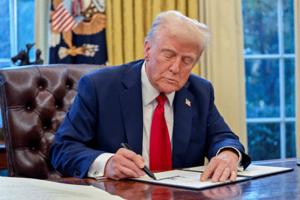
'Confusion and frustration': Trump travel ban is unclear on who can visit the US
MIAMI — A day after President Donald Trump proclaimed full or partial travel restrictions for Haiti, Cuba, Venezuela and 16 other countries, U.S. tourist-visa holders from the targeted nations lacked clarity about whether they will be allowed into the United States when the ban is in force Monday.
The confusion stems from language the White ...Read more

Trump says he and Elizabeth Warren finally agree 'on SOMETHING.' What to know
President Donald Trump and Sen. Elizabeth Warren have long had a rocky relationship characterized by deep policy disagreements and insult hurling.
Trump has called the Massachusetts Democrat a “basket case” and frequently referred to her as “Pocahontas.” In turn, Warren has described Trump as a “thin-skinned fraud” and a “wannabe ...Read more
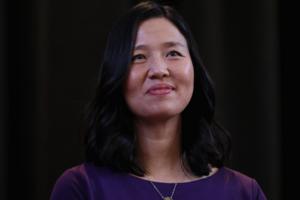
Boston Mayor Wu blasted by feds for comparing masked ICE agents to neo-Nazi group
Boston Mayor Michelle Wu was blasted again by federal officials for her criticism of immigration enforcement in the city, this time for her “sickening” remarks comparing the mask-wearing ICE authorities to a prominent neo-Nazi group.
The comparison drew a scathing response from the President Donald Trump’s White House on Thursday night.
...Read more

Venezuelans in US face heartbreak after travel ban shuts door on family reunification
For Venezuelans in the United States, a new White House proclamation has reopened old wounds and deepened fears that exile in the U.S., once a certain path to safety, will now mean permanent separation from their loved ones.
On Wednesday, the Trump administration announced sweeping travel restrictions on nationals from more than a dozen ...Read more
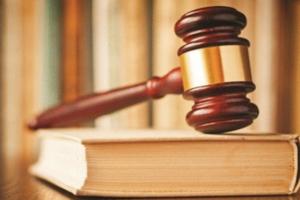
Judge blocks Trump administration long-term from arresting Columbia student Yunseo Chung
NEW YORK — A Manhattan federal judge on Thursday issued a preliminary injunction blocking the Trump administration from detaining Columbia University student Yunseo Chung, a green card holder who sued to stop her imminent arrest.
From the bench, Judge Naomi Reice Buchwald also denied the federal government’s motion to dismiss Chung’s case...Read more
Seals playing computer games for science reveal how they navigate in murky water
One by one, Nick, Luca and Miro took their places in front of a screen at a German research lab to participate in a video game for science.
The task was straightforward. While viewing a simulation of moving through the ocean, the subjects would touch a red target on the left if they thought they were moving left, and a red target on the right ...Read more

Good Samaritan holds suspect at gunpoint, stops Georgia carjackings, police say
In the span of just minutes, a good Samaritan was able to stop two carjackings in Cobb County, Georgia, and prevent the suspect from running away.
The carjackings happened Monday evening near the intersection of Delk Road and Franklin Gateway in Marietta, Georgia. In both instances, police said, 66-year-old Gary Edwards ran to help the victims....Read more

Adults making under $80K can't afford to live comfortably in any state: report
A single adult earning less than $80,000 per year cannot afford to live comfortably in a single U.S. state, a new report found.
The report, released by SmartAsset on June 4, also revealed that families of four must earn more than $200,000 to live comfortably in nearly every state.
To reach these conclusions, SmartAsset — a personal finance ...Read more

US imposes sanctions on four ICC judges over 'abuse of power'
WASHINGTON — The Trump administration announced sanctions on four judges of the International Criminal Court for alleged “transgressions” against the U.S. and Israel, escalating pressure on what the U.S. labels a highly politicized institution.
The decision follows President Donald Trump’s executive order in February authorizing ...Read more

VA employees rally in Philly: 'Save our jobs, save our vets'
Dozens of Philadelphia workers from the Department of Veterans Affairs gathered Thursday under an unyielding sun chanting: “Save our jobs, save our vets.”
Come lunchtime, allies and members of the American Federation of Government Employees arrived at Baltimore and University Avenues, outside the Cpl. Michael J. Crescenz Department of ...Read more
News briefs
Supreme Court revives straight woman’s job-bias lawsuit
WASHINGTON — The U.S. Supreme Court revived a job-bias lawsuit by a woman who says she suffered so-called reverse discrimination because she’s straight, in a ruling that makes it easier to bring similar cases to trial in parts of the country.
The justices unanimously said a federal ...Read more
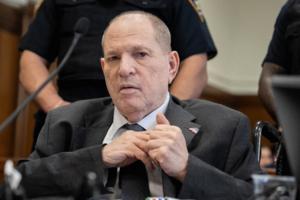
Jury deliberations begin in Harvey Weinstein's NYC sexual assault retrial
NEW YORK — Jurors in Harvey Weinstein’s sexual assault retrial in Manhattan finished their first day of deliberations Thursday, as they mull whether the disgraced Hollywood heavyweight leveraged his power to sexually assault three women.
Weinstein, 73, is on trial in Manhattan Supreme Court for criminal sex act and rape, after his landmark ...Read more

Why Paramount's efforts to settle Trump's lawsuit have drawn mounting political heat
Paramount Global's efforts to appease President Donald Trump could carry a steep price, and not just financially.
As Paramount executives struggle to win government approval for its planned sale, the legal risks and political headaches are spreading — from Washington to Sacramento.
Three U.S. senators have warned Paramount's controlling ...Read more
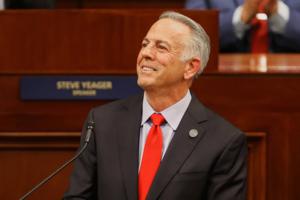
Trees, water, shade: Nev. Gov. Joe Lombardo OKs extreme-heat bill after 2023 veto
Nevada’s biggest cities and counties must now incorporate protective heat measures into urban planning because of a newly signed law.
In a win for environmental groups, Gov. Joe Lombardo, a Republican, signed Assembly Bill 96 following the veto of a similar bill in the 2023 legislative session. At the time, he suggested there was a lack of ...Read more

Musk says SpaceX to decommission Dragon spacecraft
WASHINGTON — Elon Musk said he was going to decommission SpaceX’s Dragon spacecraft that ferries cargo and people to the International Space Station for the U.S., escalating a days long spat between the billionaire and President Donald Trump.
SpaceX’s Dragon spacecraft is the company’s primary vehicle for sending astronauts and cargo ...Read more
Popular Stories
- Trump says call with Xi yielded rare earths progress, more talks
- Florida Bar complaint accuses Bondi of 'misconduct' as US Attorney General
- Colorado official sues Gov. Jared Polis, alleging he ordered state to turn over information to satisfy ICE subpoena
- Cuban detainees launch protest at Florida's Krome detention center, line up to form SOS signs
- Michigan inmates rig tablets to conduct 'criminal' activity, access pornography





